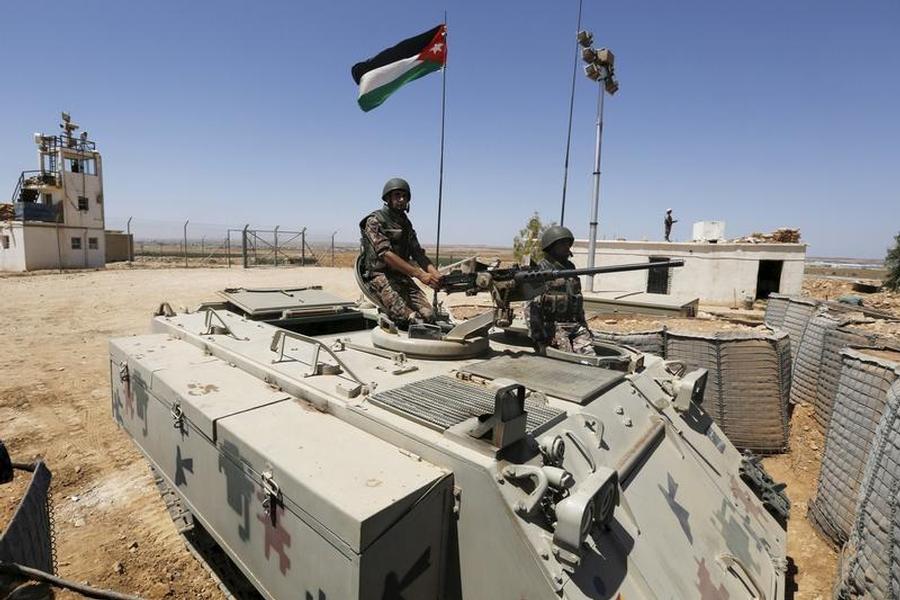Beirut- The direct Jordanian military involvement in the Syria crisis, through painful blows launched against ISIS on the Syrian territories, has reflected a strategic shift in the Jordanian security plans on this front. This shift followed the unprecedented expansion of ISIS towards Southern Syria, thus exposing Jordan to a direct threat.
These developments called for a new form of response to the crisis, and portrayed features of a new strategy that started by encouraging the establishment of a U. S,-proposed “safety zone” in South Syria.
Russia didn’t reject the proposal, as it would develop the verbal agreement between Moscow and Amman on peace in Southern Syria, which started with the first phase of the direct Russian military intervention. This agreement will pave the road to establish this zone, after ISIS has captured al-Raqban Refugees Camp and obliged Jordan to increase its direct military activity in the Syrian Desert.
The “security pillow” strategy adopted by Jordan over the past years has lost its efficiency in confronting terrorism. Since the beginning of the crisis, Jordan worked on backing its supporters among the Syrian fighting factions, to force ISIS out from its borders and avoid its expansion.
However, the developments in Syria, shifts of international positions, and plans set for a political solution, have altered the scene’s features and imposed new threats, including ISIS’ expansion towards the south.
Therefore, the past week saw a direct intervention from the Jordanian Royal Army, which targeted the terrorist organization’s strongholds in the Syrian territories. A statement by the Jordanian army reported that drones destroyed ammunition stores, and car bomb workshops, leading to the killing and wounding of many ISIS members.
Experts linked this operation with the talks on a “safe zone” proposed by the U.S. President Donald Trump; however, field indicators which came in correspondence with the operation, prove it was a proactive independent step.
Jordanian Political Analyst Mohammad Abu Rumman told Asharq Al-Awsat that the “safe zone” proposal haven’t reached maturity phase yet. Abu Rumman added that this idea is pending till Astana talks, which are expected to maintain the ongoing ceasefire in Syria, reach a military treaty, and then establish safe zones in Northern and Southern Syria.
“Safe zone”: A step closer to a solution
According to Abu Rumman, Jordanians see that a safe zone in Syria should be dedicated for Daraa Governorate. The zone would be established based on an agreement among Jordan’s British and U.S. partners and Russia and the Syrian regime. Moscow would be the regime’s guarantee to exclude the zone from the military operations, he said. The Jordanian expert added
that his country considers the safe zone in Syria a key factor for any solution and an important step on the way towards a political solution.
The problem of Al-Raqban Camp
The expert continues by saying that ISIS’ expansion to Al-Raqban Camp in Al-Suwayda Governorate has represented the biggest threat to Jordan. The Jordanian Army depends on Syrian factions to help it in confronting ISIS, so the terrorist organization has sought to weaken these factions.
Abu Rumman suggests that to respond to these threats, the Jordanian Army shall increase its direct military intervention in the Syrian Desert, which may include direct clashes with ISIS.
Yarmouk
The Yarmouk region also represents a major threat to Jordan, especially with the pro-ISIS Khalid ibn al-Walid Army spreading on the borders with the occupied Golan Heights, near the Jordanian borders.
However, neutralizing these threats in this region is complicated because of the Israeli factor. According to Abu Rumman, this region represents a secondary threat as ISIS’ forces in it are besieged by the Free Syrian Army forces, which have received significant support from the Jordanian Military Operations Center (MOC) since the beginning of the Syrian crisis. He also suggested a possible participation from both Jordan and Israel in combatting ISIS in this region, considering its critical geographic location.
It is worth noting that ISIS has expanded to the south, after the series of defeats it faced in the north and east, seeking to expand its control in West Daraa. Clashes have kicked off after ISIS-linked factions have launched attacks in the region surrounding Golan Heights.
